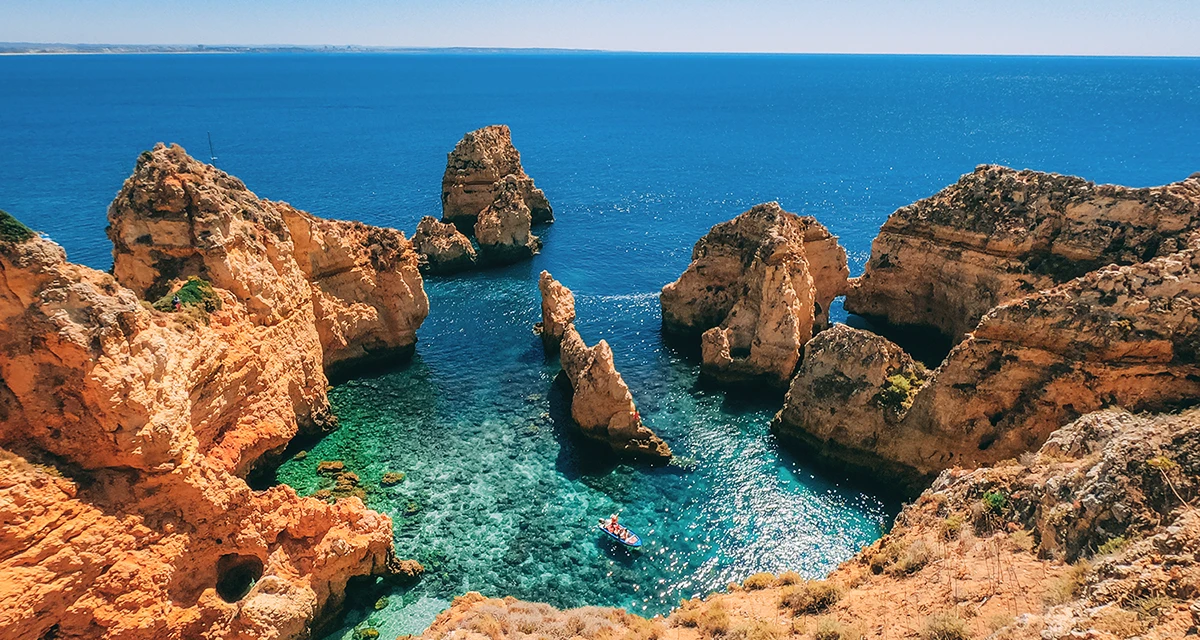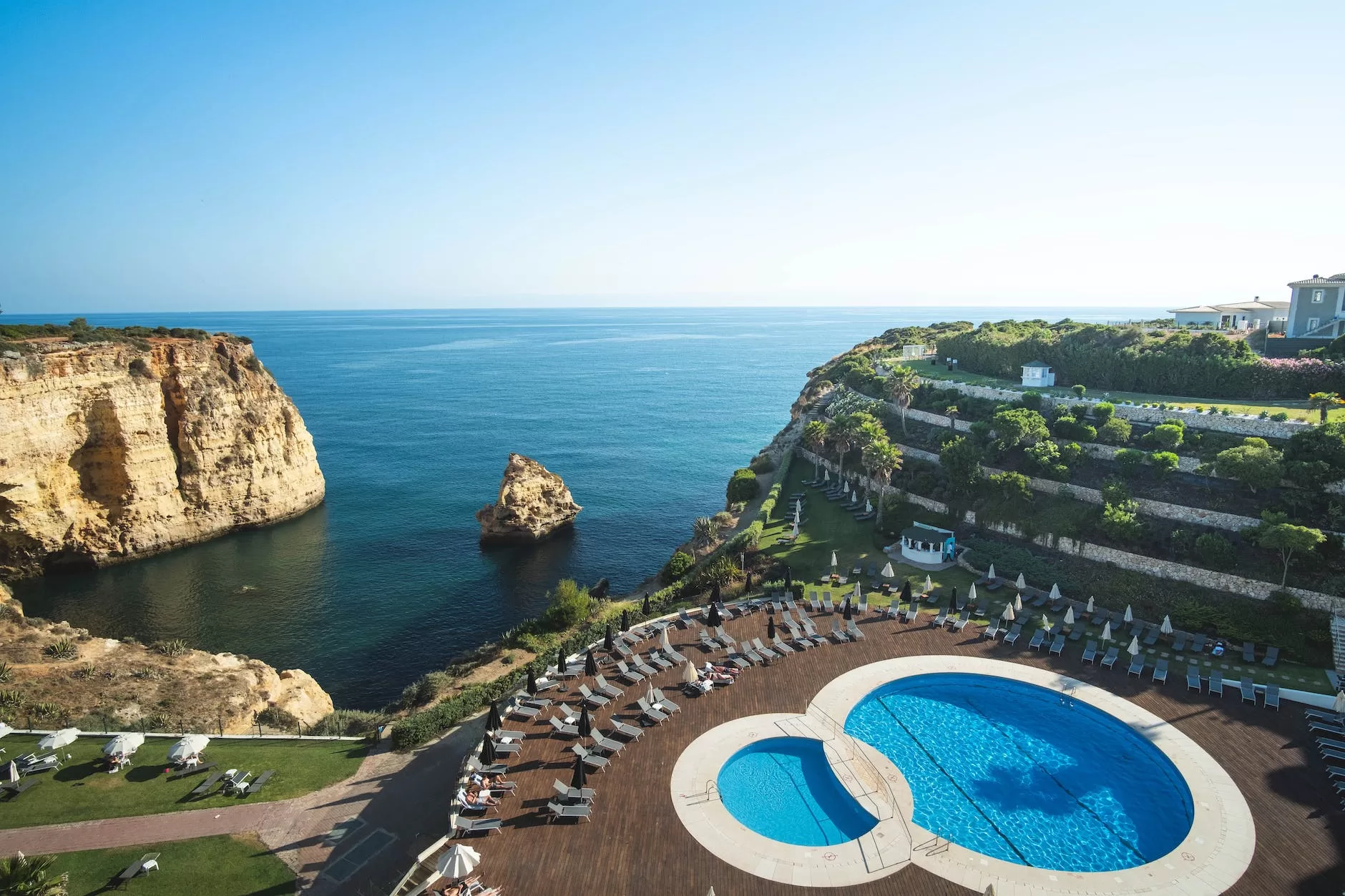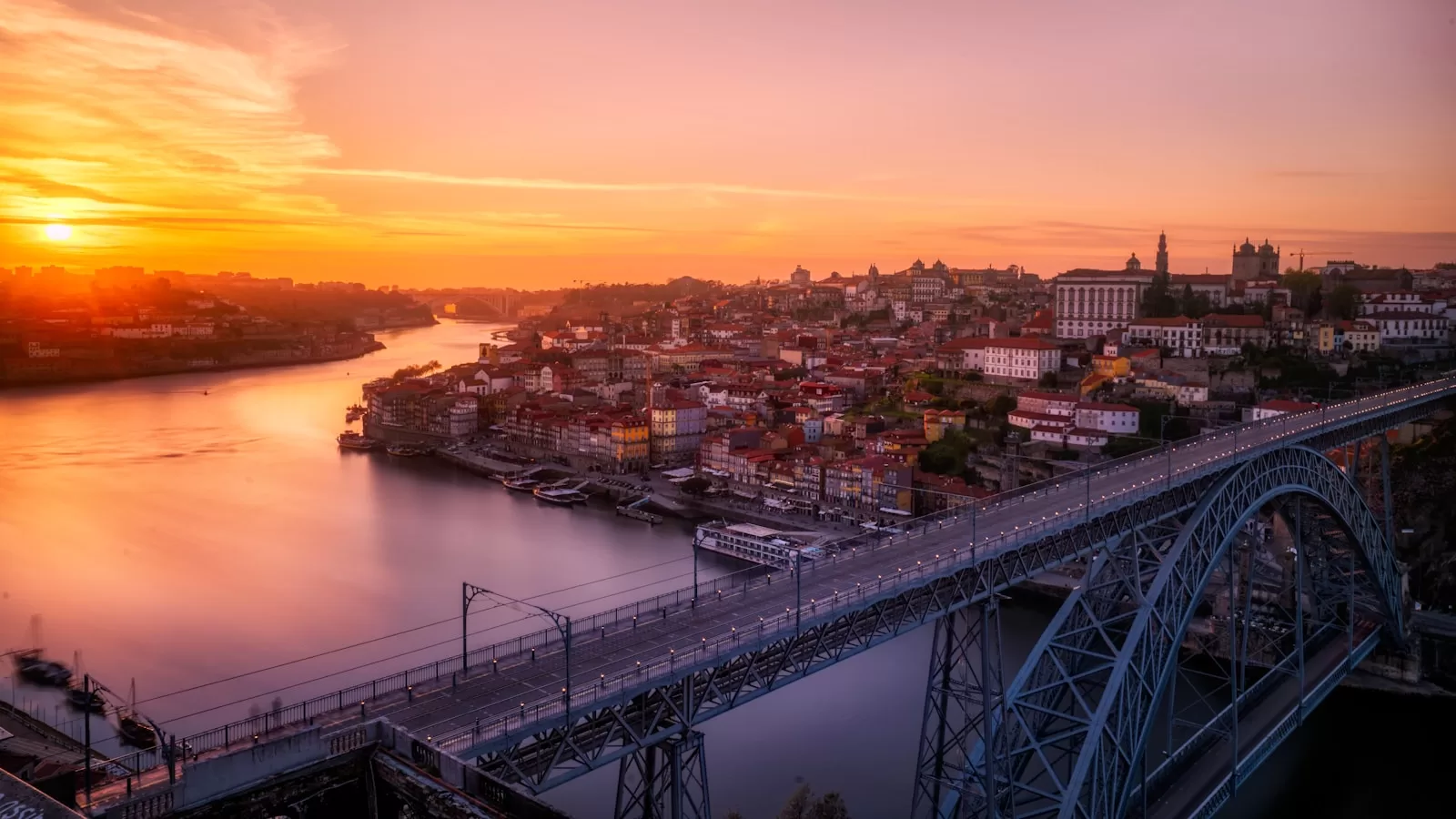Let me guess—you’ve landed in Lisbon or Porto, and suddenly, Duolingo’s tiny green owl ghosted you. “Wait… I thought I knew some Portuguese phrases?” Sound familiar?
Don’t worry. I’ve been there. Spanish helped me a bit, sure—but Portuguese? It hits different. Between the shushy “sh” sounds and the nasal vowels, it feels like French and Russian had a baby… in Brazil. But fear not, fellow adventurer. I’ve collected 50 phrases that will make your Portuguese trip smoother than a fresh pastel de nata.
And, because we’re practical around here, I’ve included what to say and how to respond (or at least pretend you know what’s going on).
Basics to Survive Day One

Day one in Portugal was a mix of awe, caffeine, and mild panic—especially when I realized my Spanish wouldn’t save me from the rapid-fire, mushy-mouthed Portuguese I was hearing. But a few key phrases became my survival kit. I must’ve said “Bom dia” a hundred times that morning, just to feel like I belonged.
Asking “Fala inglês?” (Do you speak English?) was my lifeline, and “Quero um café, por favor” quickly became muscle memory—because if there’s one thing Portugal takes seriously, it’s coffee. Even just saying “Desculpe” as I awkwardly fumbled past people in tight bakery lines helped smooth over my cluelessness. Trust me: Most folks will appreciate the effort even if your accent is a bit tragic. Just throw in a smile and “obrigado/a” like you mean it.
Here are some other words you can add to your Portuguese arsenal:
| 🇵🇹 Phrase | 🇺🇸 Meaning | 🗣 How to Respond |
|---|---|---|
| Olá! | Hello! | Olá! / Tudo bem? |
| Bom dia | Good morning | Bom dia! |
| Boa tarde | Good afternoon | Boa tarde! |
| Boa noite | Good evening/night | Boa noite! |
| Tudo bem? | How are you? | Tudo bem / Tudo ótimo / Mais ou menos |
| Como se chama? | What’s your name? | Chamo-me Carter. E você? |
| Prazer! | Nice to meet you | Igualmente! (Likewise!) |
| Até logo | See you later | Até já / Até amanhã |
| Tchau | Bye | Tchau! |
| Desculpe | Sorry / Excuse me | Não faz mal / Sem problema |
Portuguese Phrases to Order Food

The first time I ordered food in Portugal, I accidentally asked for a kiss instead of cheese. True story—“um beijo” sounds a lot like “um queijo” when you’re jet-lagged and overconfident. Lesson learned.
When dining out, I leaned heavily on “Quero isto, por favor” while subtly pointing at the menu like a confused raccoon. If I felt brave, I’d ask “O que recomenda?” and let the waiter guide me toward bacalhau or something smothered in olive oil and garlic. The phrase “A conta, por favor” became a ritual at the end of every delicious meal, even if I didn’t want it to end.
And don’t forget to ask, “Está incluído uma gorjeta?”—tipping culture here is chill, but clarity is gold. Honestly, half the fun of eating out in Portugal is how your server might gently chuckle at your pronunciation—and then proudly bring you something amazing anyway.
| 🇵🇹 Phrase | 🇺🇸 Meaning | 🗣 How to Respond |
|---|---|---|
| Quero isto, por favor. | I want this, please. | Claro! (Sure!) |
| Pode trazer o menu? | Can you bring the menu? | Aqui está. |
| O que recomenda? | What do you recommend? | Bacalhau à Brás! |
| Sem lactose/glúten, por favor. | Without lactose/gluten, please. | Sem problema. |
| A conta, por favor. | The bill, please. | Já vem. (Coming right up.) |
| Está incluído o serviço/gorjeta? | Is the tip included? | Sim/Não. |
Portuguese Phrases to Get Around Like a Pro

Navigating Portugal’s streets, metros, and endless hills was an adventure in humility. I got weirdly comfortable saying “Onde fica…” and letting locals finish the sentence for me, because the streets in places like Lisbon or Porto twist and turn like medieval spaghetti.
I learned early on that “Está longe?” is the polite way of asking, “Do I need hiking boots for this?” More than once, someone answered with “É já ali” (It’s just there), which usually meant, you’ll be sweating in 10 minutes.
When public transport was involved, “Qual é a paragem?” (Which stop is it?) and “Onde compro o bilhete?” (Where do I buy the ticket?) It helped save me from looking too touristy, though the backpack had already given it away. Whether by train, tram, or sheer stubbornness, these phrases helped me feel a little less lost and much more like an Atypical Vagabond.
| 🇵🇹 Phrase | 🇺🇸 Meaning | 🗣 How to Respond |
|---|---|---|
| Onde fica…? | Where is…? | Fica ali / Siga em frente |
| Está longe? | Is it far? | Mais ou menos / Um pouco |
| À esquerda / À direita | To the left / To the right | Vira aqui. |
| Pode ajudar-me? | Can you help me? | Claro! Em que posso ajudar? |
| Qual é o melhor caminho para…? | What’s the best way to…? | Vá pela rua principal. |
| Há Wi-Fi aqui? | Is there Wi-Fi here? | Sim, a senha é “pastel123” |
Shopping & Markets (AKA the Wallet Workout)

Shopping in Portugal is an experience—part treasure hunt, part language game show. From quirky boutiques in Porto to Saturday markets in the Algarve, I quickly learned that “Quanto custa?” was my golden phrase. It opened doors, sparked conversations, and sometimes even earned me a cheeky discount.
When browsing, I’d toss out a casual “Estou só a ver” (I’m just looking), which buys you time and keeps the pressure off. If I needed another size, “Tem outro tamanho?” usually got the job done—unless I pronounced “tamanho” like a taco, in which case I just got a polite smile. Most places accept cards, but “Posso pagar com cartão?” kept me from looking clueless at the register.
Pro tip: carry some cash for small shops or older cafés where card machines are more myth than reality.
| 🇵🇹 Phrase | 🇺🇸 Meaning | 🗣 How to Respond |
|---|---|---|
| Quanto custa? | How much does it cost? | Custa 10 euros. |
| É caro/barato. | That’s expensive/cheap. | Temos desconto. 😉 |
| Posso pagar com cartão? | Can I pay by card? | Sim / Só dinheiro |
| Estou só a ver. | I’m just looking. | Tudo bem. |
| Tem outro tamanho/cor? | Do you have another size/color? | Vamos ver… |
Emergencies Portuguese phrases

Let’s hope you never need these phrases—but if you do, you’ll be glad you learned them. One rainy day in Lisbon, I twisted my ankle on those charming-yet-treacherous calçada sidewalks. That’s when “Preciso de ajuda!” (I need help!) came out of my mouth, unplanned but clearly urgent.
Locals were incredibly kind—someone called for help using “Pode chamar uma ambulância?”, while another reassured me with “Vai ficar tudo bem” (Everything will be okay). If you’re ever sick, “Estou doente” or “Preciso de um médico” will get the message across fast.
And yes, if you get lost or robbed—“Estou perdido/a” or “Fui roubado/a”—those phrases are essential. Portugal is generally super safe, but a few emergency words go a long way in keeping your trip from going full travel horror story.
| 🇵🇹 Phrase | 🇺🇸 Meaning | 🗣 How to Respond |
|---|---|---|
| Ajuda! | Help! | O que aconteceu? |
| Chame uma ambulância! | Call an ambulance! | Já está a caminho! |
| Estou perdido/a. | I’m lost. | Onde está hospedado? |
| Fui roubado/a. | I was robbed. | Ligue para a polícia. |
| Estou doente. | I’m sick. | Vamos ao centro de saúde. |
| Preciso de um médico. | I need a doctor. | Temos aqui perto. |
Slang & Everyday Coolness

If Portuguese textbooks make you sound like a formal robot, slang is your secret weapon for sounding like you belong. Tossing around casual expressions like “fixe” (cool) or “na boa” (no worries) gives serious street cred and helps you blend in with locals, especially in relaxed social settings.
Want to sound even cooler? Drop a “bora lá” when rallying friends to leave a bar, or say “estou cheio de fome” to express you’re starving—it hits harder than just saying “I’m hungry.”
Slang phrases aren’t just fun—they’re social glue. Mastering them turns awkward tourist moments into shared laughs. Just be careful not to overuse them in formal settings… your AirBnB host’s grandmother probably doesn’t want to hear you say “carago” at breakfast.
| 🇵🇹 Phrase | 🇺🇸 Meaning | 🗣 How to Respond |
|---|---|---|
| Fixe! | Cool! | Fixe mesmo! |
| Na boa | No worries | Tranquilo! |
| Estou cheio de fome | I’m starving | Vamos comer! |
| Bora lá! | Let’s go! | Bora! |
| De nada | You’re welcome | Obrigado/a |
| É isso aí! | That’s it! | Exatamente! |
Love, Flirting & Awkward Smiles

Flirting in Portuguese walks a charming line between poetic and playful, and it’s all about tone and confidence. A simple “És muito gira” (You’re really cute) works wonders—especially when paired with a warm smile and no creepy vibes.
Want to test the waters? “Posso pagar-te um café?” (Can I buy you a coffee?) is a low-pressure way to spark a connection without sounding too forward. If things go well, phrases like “Quero passar mais tempo contigo” (I want to spend more time with you) or the classic “Gosto de ti” (I like you) can lead to something more.
As with any culture, reading the room is key—Portuguese people value sincerity, so a well-timed compliment usually goes a lot farther than cheesy pickup lines.
| 🇵🇹 Phrase | 🇺🇸 Meaning | 🗣 How to Respond |
|---|---|---|
| És lindo/a | You’re beautiful | Obrigado/a, és muito simpático/a |
| Posso pagar-te um café? | Can I buy you a coffee? | Claro / Talvez um dia |
| Quero passar mais tempo contigo | I want to spend more time with you | Também eu. |
| Gosto de ti | I like you | Eu também gosto de ti. ❤️ |
| Vamos dar um passeio? | Want to take a walk? | Boa ideia. |
Airport/Hotel Portuguese Phrases
Hotels and airports are where your inner adventurer either shines or crashes—depending on your phrase game. Upon arrival, saying “Tenho uma reserva” (I have a reservation) is your first boss battle. When you can’t find check-in, ask “Onde é o check-in?” or “A que horas é o check-out?” to keep things smooth.
Want Wi-Fi? “Qual é a senha do Wi-Fi?” should be on speed-dial. Over at the airport, “Onde fica o portão?” (Where is the gate?) or “Quanto tempo até o embarque?” (How long until boarding?) will keep you from panicking at the last minute.
And if your bag pulls a disappearing act? “A minha mala não chegou” (My bag didn’t arrive) is your starting point with the airline staff. These phrases won’t win you an Oscar, but they will make your travel days much less chaotic.
| 🇵🇹 Phrase | 🇺🇸 Meaning | 🗣 How to Respond |
|---|---|---|
| Tenho uma reserva | I have a reservation | Em nome de…? |
| Onde é o check-in? | Where’s check-in? | Siga por ali. |
| Qual é a senha do Wi-Fi? | What’s the Wi-Fi password? | Está no cartão do quarto. |
| A que horas é o pequeno-almoço? | What time is breakfast? | Das 7h às 10h. |
| Pode chamar um táxi? | Can you call a taxi? | Com certeza! |
Cussing Like a Local (Use With Caution… or a Wink)

Portuguese cussing is passionate, poetic, and often completely bizarre. In Portugal, swearing isn’t always meant to offend—it can be funny, expressive, and used among friends like a weird bonding ritual. But don’t go shouting these at strangers unless you’re ready to get the look.
Here are some common curses and edgy phrases—and what they really mean.
| 🇵🇹 Swear / Slang | 🇺🇸 Meaning / Usage | Context / Response |
|---|---|---|
| Merda! | Sh*t! | Stub your toe? This is your go-to. |
| F*da-se! (fó-da-se) | F**k it! / Oh sh*t! | Frustration, surprise, rage. Kind of like the Swiss Army knife of curses. |
| Porra! | Damn! / F**k! | Slightly less intense than fda-se*, still very expressive. |
| Car*lho! (car-AL-yo) | F**k / Dick (literal), used for frustration | Like shouting “Goddammit!”—aggressive, but commonly used. |
| Vai-te lixar! | Screw you! (PG version of “F off”) | Annoyed but not totally raging. |
| Que se lixe! | Screw it / Whatever | Resigned, chill profanity. Think: “Let it go… but grumpier.” |
| Estou farto disto! | I’m fed up with this! | Less of a curse, more of a declaration before walking out dramatically. |
| Chiça penico! | Holy crap! (kinda cute) | Old-school, less aggressive. Grandma-safe. |
| Estás a gozar comigo? | Are you messing with me? | Said when someone’s being ridiculous or sarcastic. |
| P*ta que pariu! | Motherf**er! (Lit. “the whre who gave birth to…”) | Very strong. Don’t use this unless you really mean it. |
⚠️ Note: Portuguese swear words hit different depending on tone and region. What’s common in Porto might be too harsh in the south—or too hard in the Alentejo.
Atypical Last Thoughts

Portuguese phrases may not roll off your tongue like Spanish or Italian, but it does sound like poetry dipped in espresso. With these 50 Portuguese phrases, you’ll blend in just enough to avoid looking like a lost tourist (most of the time). Keep practicing, stay curious, and remember: a smile and a “por favor” go a long way here in Portugal.
If all else fails, just point dramatically and say, “isso!”
Subscribe
Are you an avid traveler seeking inspiration for your next adventure? Look no further than the Atypical Vagabonds newsletter. By subscribing to our newsletter, you gain access to a treasure trove of travel tips, destination guides, and captivating stories from around the globe. Our knowledge in exploring off-the-beaten-path destinations. We offer a refreshing perspective on travel, encouraging you to embrace the unconventional and discover unique experiences. Join the community today and let our wanderlust-inducing content inspire you. Therefore, you can embark on extraordinary journeys. Subscribe to receive their latest updates directly in your inbox and never miss a travel adventure again.
Donations
Love what you’re seeing on Atypical Vagabond? Help us keep the adventures coming! Consider donating through PayPal’s secure payment system. Every contribution goes a long way in fueling our mission to bring you more thrilling content and unforgettable experiences. Join us in shaping the future of travel—donate today!




Leave a Reply